
If you are a working class adult like me, you are always wondering where to keep your savings. This is because the traditional bank saving accounts is not helping us beat inflation anymore. I am always looking for where to put my money to grow. You should too.
Here is why.
According to the World Economic Forum, the United States inflation rate was 3.2% in 2011 compared to 8.3% in 2022. What this means is money stashed in a savings account in 2011, lost 5.1% of its purchasing power. To simplify, the money you put in savings between the years is actually worth less than what you will cash out.
Let me elaborate with an example.
If you had $5000 in a basic savings account sitting duck in 2011, its worth was $4745 in 2022. Although you can cash exactly $5000, your $5000 has a $4745 purchasing power. It is called inflation. One of the negative economical factors which does not favor saving money in an ordinary bank account.
So, where to put your savings to grow then?
There are places to save money and earn interest annually, which could match inflation or beat it. Credit unions and banks offer products which can help your money generate money, while you are saving it. Here are where to keep your savings.
Safest Investments With Highest Returns For Your Savings
The usual bank account types- savings, business and checking, offer by banks and credit unions are not enough to safeguard the worth of your savings. Consider one of the followings below:
1. Certificate Of Deposit(CD)
A certificate of deposit is a savings offer by banks and credit unions to lock your savings for a fixed period of time with an agreed interest. The interest rates on a CD varies from 1.76% to 5% annually. It all depends on the bank.
Banks like CITBank will guarantee an interest rate of 5% APY on Certificate of Deposit for six months or more. Annual percentage yield (APY) is the interest your savings yield per year. It may not be much, but there is nothing to lose since you are saving anyways. And, it is way higher than traditional savings account interest rate.
Benefits Of A Certificate Of Deposit Savings Account
The best part of a CD is there is no fee attached to it. Once you deposit it with your bank, you just have to wait until the end of the agreed period before you can cash out your principal and interest. If you decide to keep it long term, you will definitely beat inflation.
Let us use the inflation mentioned earlier to elaborate on what I mean by beating inflation with a certificate of deposit account. Here is what I mean, my good reader.
If you had put $5000 in a CD with an interest rate of 4.5% APY in 2011 when the inflation rate was 3.2%, you would have $2475 in 2022. Although the inflation rate in 2022 is 8.3%, your CD’s annual percentage yield is 4.5% of your total savings per year. This is one of the benefits of CD savings account. In 2022, your total savings is now $7475 rather $5000.
It may not seem much, but it is better than stashing your savings in a basic savings account. The average national bank interest of 0.45% will not do much for you. This is because inflation rate will be higher than it. As a result, you will actually lose money letting your money sit in the bank over the years. Do you understand now?
What Is Considered A Good CD Rate?
A good CD rate is 4% and above. Some online banks may offer you a little above 5%. But, you have to make sure it is a reputable online bank with great customer services.
As you can see, a certificate of deposit is the safest place to put money to earn interest. This is because when it comes to stashing your savings, a CD is one of the safest investments with the highest return for your savings.
2. High-Yield Interest Saving Accounts
A high-yield savings account is a good idea against inflation. It is a good place where you can put your savings to beat inflation. Here is what to know.
This type of savings account offers interest rates which are about ten times greater than your usual traditional saving account. It is created as a means of competing with the traditional banks who offer remarkable banking services. The average interest rate on a high yield savings account is more than 4% annual percentage yield.
Usually, high-yield interest savings accounts are offered by online banks. This is as a means of competing with your traditional brick and mortar banks which offer a national average interest rate of 0.4% on their savings accounts.
Let us compare how money in a traditional bank saving account fares against a high-yield savings account during an inflation. Assuming you put $4000 on both accounts in 2011 when the inflation rate was 0.3%, here is what to expect.
By 2022, the $4000 on a traditional savings account with a national interest rate of 0.4% will accrue $176. On the other hand, a high-yield interest saving accounts with a 4% interest rate will accrue ten times what the traditional saving account made. It will make $1760 in interest.
Therefore, you could see the traditional saving account barely beat the inflation. This is because between 2011 and 2022, the inflation rate went from 3.2% to 8.3%. There was a 5.1 depreciation on Simply put, you wasted your time keeping your money in such a savings account. A high-yield saving account is worth it, when you want to just save money without losing its value over the years.
Are High-Yield Savings Risky?
There is nothing risky about a high-yield interest savings account. It is where to save your money. This is because you are not buying into an investment, where there is a chance of losing your capital. You cannot lose principal in a high-yield savings account.
So, what is the catch of high-yield savings then?
Well, some high-yield savings accounts may charge fees. It does not sound appealing when you think about it, since you are trying to save money. But, it is worth it in the long run since the annual percentage yield beats inflation every year. Here are what else to know about the downside of a high yield savings account.
The Downside To A High Yield Savings Account
There is a downside to a high-yield savings account. Here are what you need to know before looking for one to save money with.
- They are exclusively offered by online banks. So, finding a good online bank is very important since you cannot just walk into the bank to talk to banker about issues.
- Since you can easily withdraw your savings whenever you want, some high-yield savings account pay interest monthly which does not compound fast enough. This is because compound interest needs time to grow.
- There is a minimum balance required to open such an account. As long as you maintained this balance, you will earn interest.
- Interest rates are not fixed. It is a variable interest rate. What this means is the interest rate changes.
- You may lose your purchasing power, when your balance is not big enough to make a difference.
Given all these cons, how long should you keep money in high yield savings account?
A high yield savings account is good for half a decade or a decade. It is great for emergency funds too. This is because you will get more than what you deposit, so making it hard for inflation to reduce the purchasing power of your savings. Here are 7 Best High Interest Savings Accounts To Beat Inflation any year or decade.
3. Financial Securities
Financial securities is one of the best places to save money. This is because the compound interest of stocks, mutual funds and ETFs are absolutely rewarding. But, you will only get this result when you have a good knowledge of buying shares of companies with good financials and business structures.
35% of my savings are tied up in one of these types of financial securities. The reason why I like it, is because you can stash your savings and grow it in a good company with a strong financial foundation and good management. What these two jargons mean is a company with an improving revenue, increasing annual profits and dividends, low debt and strong financial statements.
These are what help you evaluate whether a stock is worth buying. It does not matter whether the stock of a company is selling at a very discounted price. As long as the company has all the above mentioned, your investment will beat inflation since the company consistent improving revenue and profit will improve its stock value with time.
I am not going into explanation, but I recommend you read Benjamin Graham’s Intelligent Investor and Security Analysis to get a grasp. In addition, I will not recommend you putting your savings into financial securities without having a professional banker guide you.
Why Stocks Are A Good Way To Save Money
When you invest intelligently though, it is worth it. This is because your principal amount grows in two ways which beat inflation. Namely: capital appreciation and quarterly dividend payments.
To simplify, a stock you paid $25 for, may increase to $45 depending on the financial growth of the company or stock market demand. Capital appreciation usually exceed rates offered by banking products like CDs and High-Yield Interest Savings account.
Additionally, you make money through dividend payment every three months. Let us say you bought 200 shares of a company with good financial statement. If the company pays a dividend of $1.02 a share, you will get paid $204 for 200 shares yearly. This is regardlessly of capital appreciation or depreciation.
Did you get how financial securities can help you beat inflation, my good reader?
As long as you let a seasoned and professional bank investor work with your money, do not try it on your own without prior knowledge on financial security analysis prior to investment. This is because novices usually get emotional when market demand may affect stock prices temporarily. Or worse, they speculate on stocks and lose all their savings!
I am sure you are one of those people who work hard for their money. As a result, you do not want to lose your hard-earned savings. Am I right?
Well, the above places are where to save your money. There are other places too, but a professional investment banker will help you with it. Be wary of any guru trying to convince you to put money into mainstream get-rich-quick schemes. Cryptocurrency, NFTs and other non-tangible mainstream financial products are highly volatile financial products with no assets. They will not serve your savings goals.




 Where To Cash Western Union Money Order Quickly
Where To Cash Western Union Money Order Quickly